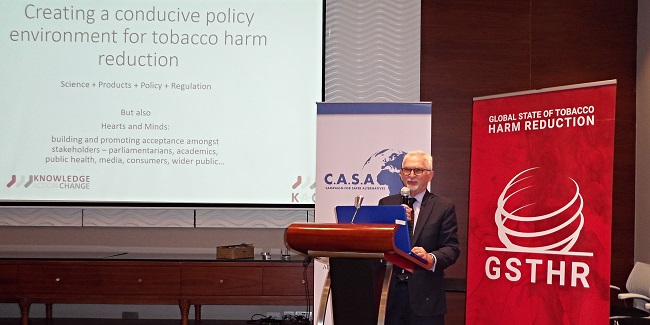Public health experts from UK-based Knowledge∙Action∙Change recently visited Nairobi, Kenya to launch No Fire, No Smoke – The Global State of Tobacco Harm Reduction 2018 (GSTHR), a landmark report on the worldwide availability, regulation, and use of lower-risk alternatives to tobacco, such as e-cigarettes (vapes), heat-not-burn devices, and Swedish snus (pasteurised oral tobacco).

The event took place at the Hilton Garden Inn Hotel, hosted by Campaign for Safer Alternatives (CASA), a pan-African tobacco harm reduction organisation based in Nairobi. Among attendees were tobacco harm reduction advocates, health advocates, electronic cigarette vendors, anti-tobacco advocates, medical students and journalists. The report was earlier also launched in Lilongwe, Malawi, an event which was hosted by an organisation affiliated to CASA.
The Global State of Tobacco Harm Reduction 2018 (GSTHR) report maps for the first time the global, regional and national availability and use of safer nicotine products (SNP), the regulatory responses to these products, and the public health potential of tobacco harm reduction. A proven public health strategy, harm reduction refers to policies, regulations, and actions that reduce health risks by providing safer forms of hazardous products or encouraging less risky behaviors, rather than simply banning them.
The advent of SNP opens up the possibility of a major advance in global public health, helping to bring about the UN goal of reducing non-communicable diseases by a third by 2030 and, moreover, at no cost to governments.
Every six seconds someone dies from a smoking-related disease and the problem is likely to worsen; the steep smoking declines in richer countries are slowing while in poorer countries smoking is set to rise. Existing forms of tobacco control are proving insufficient. While many people give up smoking, on their own or with medicinal products, many fail to do so.
“Quit or die” is no longer the only option for those who cannot give up. Safer nicotine products offer another way. There is substantial international, independent evidence that these products are demonstrably safer than cigarettes. These potential lifesaving products could lead to a global revolution in public health.
Independent evidence from the UK government’s leading public health body demonstrated recently that vaping is at least 95% safer than smoking tobacco. Yet despite the WHO Framework Convention on Tobacco Control (FCTC) of 2003 citing harm reduction as one of its main tactics, the WHO has been persistently negative about e-cigarettes, has called for their ban or strict regulation, and sees them as a threat, rather than as a public health opportunity.
“We need to halt the dramatic rises in smoking rates in Africa which are predicted by WHO,” asserted Professor Gerry Stimson, Director of Knowledge∙Action∙Change and Emeritus Professor at Imperial College London.
“Most smokers want to quit smoking, but they find it hard to stop using nicotine. Around the world, millions of lives depend on both consumer and government acceptance of safer alternatives to smoking.”
By Joseph Magero
